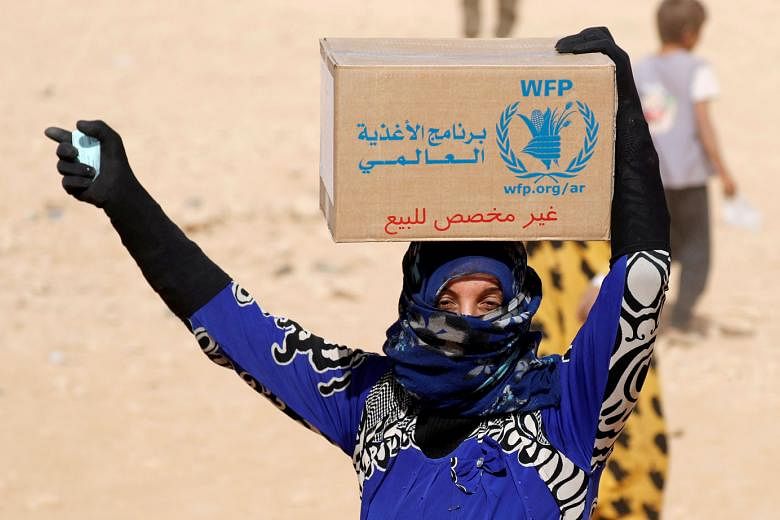OSLO • The Nobel Peace Prize was awarded yesterday to the World Food Programme (WFP) for feeding millions of people from Yemen to North Korea, with the coronavirus pandemic seen pushing millions more into hunger.
The WFP was honoured for "its efforts to combat hunger, for its contribution to bettering conditions for peace in conflict-affected areas and for acting as a driving force in efforts to prevent the use of hunger as a weapon of war and conflict", Nobel committee chairman Berit Reiss-Andersen said on unveiling the winner in Oslo.
Whether delivering food by helicopter or on the back of an elephant or a camel, the WFP prides itself on being "the leading humanitarian organisation" in a world where, by its own estimates, some 690 million people - one in 11 - go to bed on an empty stomach.
"With this year's award, the Norwegian Nobel Committee wishes to turn the eyes of the world towards the millions of people who suffer from or face the threat of hunger," Ms Reiss-Andersen said.
Founded in 1961, the United Nations (UN) organisation helped 97 million people last year, distributing 15 billion rations to people in 88 countries.
The numbers are dizzying but only a fraction of the total number in need. Despite making progress over the past three decades, the UN's goal to eradicate hunger by 2030 appears out of reach if current trends continue.
War can be caused by hunger, but hunger is also a consequence of war, the WFP said.
Its executive director David Beasley said last month: "There is no two ways about it - we can't end hunger unless we put an end to conflict."
Yemen, which is living through what the UN has described as the "largest humanitarian crisis in the world", is a stark example of this.
Both the UN and aid agencies have repeatedly raised the alarm over the disastrous consequences of the conflict that has claimed tens of thousands of lives since 2015, when a powerful military coalition led by Saudi Arabia joined the government's fight against Iran-backed Houthi rebels.
The conflict has displaced three million people and pushed the country to the verge of famine.
Two-thirds of Yemen's 30 million people do not know where their next meal will come from.
The outlook for the world has grown even bleaker this year due to the Covid-19 pandemic, which has made food more expensive and disrupted supply chains.
"In countries such as Yemen, the Democratic Republic of Congo, Nigeria, South Sudan and Burkina Faso, the combination of violent conflict and the pandemic has led to a dramatic rise in the number of people living on the brink of starvation," the Nobel committee said.
Singapore's flagship carrier Singapore Airlines and the Temasek Foundation partnered the WFP during the pandemic, arranging flights to transport medical supplies and other essential items to areas of need around the world. Temasek contributed up to US$6.5 million (S$8.8 million) to cover the flight costs.
The global recession caused by the virus risks pushing an additional 83 million to 132 million people into hunger, the UN said in a July report.
The virus will also affect the Nobel Peace Prize ceremony on Dec 10 in Oslo, which has been scaled back due to Covid-19 curbs.
The award consists of a gold medal, a diploma and a cheque for 10 million Swedish kronor (S$1.5 million).
"We are deeply humbled to receive the #NobelPeacePrize. This is an incredible recognition of the dedication of the @WFP family, working to end hunger every day in 80+ countries," Mr Beasley tweeted.
"This is unbelievable," he said. "And this because of the WFP family, they are out there in the most difficult, complex places of the world.
"Whether it is war, conflict, climate extremes, it doesn't matter. They are out there, and they deserve this award."
AGENCE FRANCE-PRESSE

